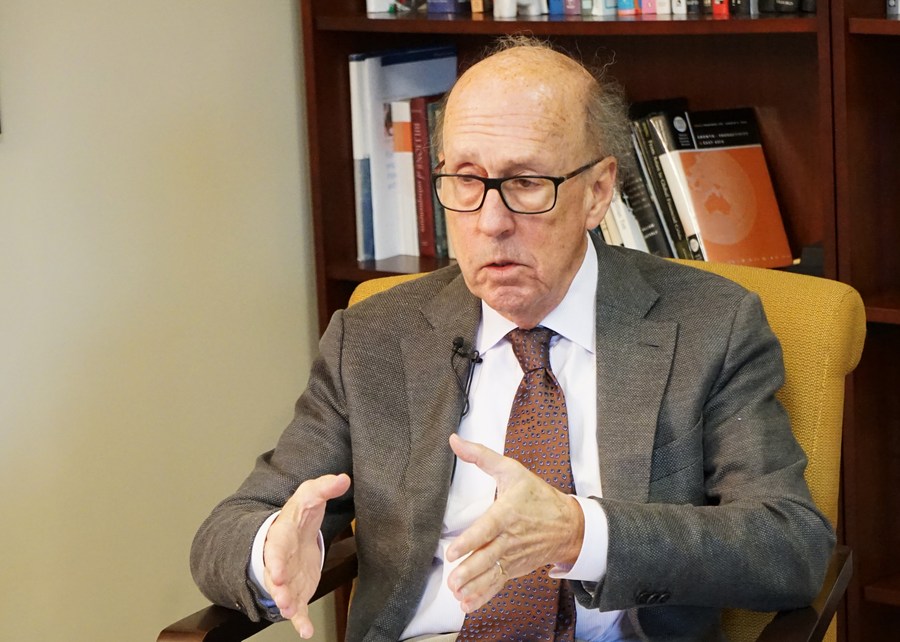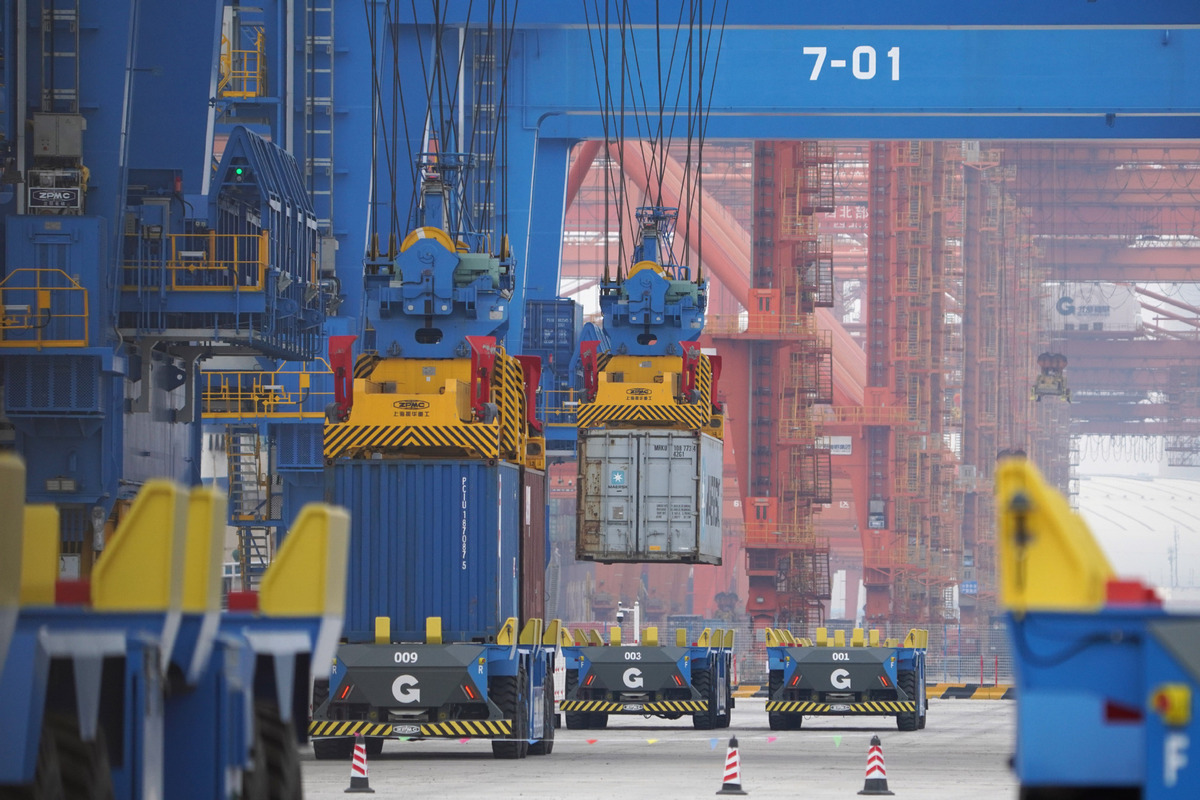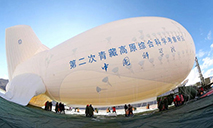Move towards U.S.-China decoupling a recipe for disaster, says Yale’s Stephen Roach

File photo shows Stephen Roach, senior fellow at Yale University's Jackson Institute of Global Affairs, speaking during an interview with Xinhua in New Haven, the United States, Feb. 6, 2020. (Xinhua/Xu Yuan)
A move towards U.S.-China decoupling is “a recipe for disaster for the U.S. and China,” said Stephen Roach, a senior fellow at Yale University’s Jackson Institute of Global Affairs, on Tuesday during an online interview with People’s Daily Online.
The former chairman of Morgan Stanley Asia also warned that the U.S.-China relationship has gone from bad to worse, which will have serious consequences for world stability and global growth if the conflict continues, adding that new approaches are urgently needed to address the confrontation.
“The current approach to conflict resolution, which can best be examined through the so-called Phase-One trade deal that was reached between the United States and China in January of 2020, is a failed approach. It has not worked at all in alleviating tensions,” said Roach, who proposes a different approach to addressing the relationship in his new book, Accidental Conflict: America, China, and the Clash of False Narratives, which will be published in October.
Look to the benefits of expanded growth opportunities
Some politicians and experts from the U.S. believe that cutting ties with China would be beneficial for the U.S. When asked about these claims, Roach said that a move towards U.S.-China decoupling is “a recipe for disaster for the U.S. and China.”
Over the last 40 years, the U.S. and China have built “a deep and strong relationship,” but right now there are political pressures that have arisen that have had a serious impact on the relationship, said Roach.
He explained that the high level of tariffs that have been imposed by the U.S., with reciprocal tariffs imposed by China on U.S. products, are negative for both countries.

Photo taken on March 19, 2020 shows U.S. dollar banknotes in Washington D.C., the United States. (Xinhua/Liu Jie)
“We have to recognize that the current framework of tariff escalation and sanctions on technology and other companies is counterproductive,” said Roach.
“Both the United States and China are heavily integrated with the rest of the world,” he said. “You can’t address these imbalances on a country-by-country basis,” Roach said, who is an economist by training. “If you want to restore greater balance, we in America need to save more and you in China need to save less and that will be a very important step in resolving the trade imbalances.” However, he pointed out that “the idea of improving our relationship by narrowing a bilateral trade imbalance is not only counterproductive, but it misses the real opportunity that we need to seize.”
The best way to ensure expanded growth opportunities between the U.S. and China, he recommended is to “go back to negotiating a new bilateral investment treaty, something that we were very close to reaching an agreement on before Donald Trump was elected president [in November 2016].”
“We need to look at growth rather than attempting to fix a multilateral trade imbalance by focusing incorrectly on bilateral trade deficits or surpluses,” Roach added. “We have the wrong approach. And we need a new approach.”
Shift away from distrust towards a more trusting relationship
Roach’s first and highly consequential recommendation is to find areas of mutual interest where the two sides can start to shift back away from a climate of distrust towards a more trusting relationship between the two countries. He highlighted three areas in particular that provide opportunities for rebuilding trust: climate change, global health policy and cyber security.
Last year, the two countries released their China-U.S. Joint Glasgow Declaration on Enhancing Climate Action in the 2020s, which aimed to better address greenhouse gas emissions and climate change.
But Roach said that the climate agreement at this point is tentative at best and given that the world economy is now weakening again amid sharply rising oil prices, countries are reverting back to greater reliance on carbon-intensive sources of energy such as coal, which raises renewed concerns about further emissions and their impact on the climate, especially in light of another year of severe weather witnessed all around the world.
The second area that Roach proposed for the two sides to focus on is global health. “There continues to be great animosity between the U.S. and China on issues over the sources of COVID-19.” He added the two sides have failed to move beyond that and embrace collaborative efforts in global health and disease prevention practices.
“By definition, this pandemic is not a China problem. It’s not a U.S. problem. It’s not a problem for any one country. It’s a problem that is global in scope,” he argued. “No one country can solve a global pandemic on its own.”
In such a highly interconnected world, and given the very high level of transmissibility of the newest variants of COVID-19, the economist strongly urged nations to come together and share best practices in terms of public health and scientific development.
The third area of mutual interest that Roach proposed is cybersecurity, especially with the recent outbreak of ransomware attacks and continued foreign pressures on online hacking and cyber espionage, which has become a threat that is even more urgent to address today given the outbreak of military conflict in Eastern Europe. He said that American and Chinese experts in the area of cybersecurity should reestablish contact and mutual collaboration on a military-to-military basis as well as on private-to-private sector basis, and establish new protocols for cybersecurity.

A visitor tries paying with e-CNY at the 2021 World Artificial Intelligence Conference, July 7, 2021. (People’s Daily Online/Long Wei)
New approaches to addressing the relationship
“We need to do that before it's too late,” Roach said, who stressed four new approaches to address the U.S.-China relationship that “is in need of serious attention.”
The first approach is rebuilding mutual trust, by focusing on climate, global health and cybersecurity. “Without trust, we will get nowhere in resolving the deepening conflict that continues to impact both the United States and China,” he said. The second proposal is abandoning the Phase-One trade deal and its associated tariffs because it has been “counterproductive” for both countries. Moving ahead and completing negotiations on a bilateral investment treaty is the third approach, with a focus on growth as opposed to bilateral trade imbalances. And the fourth one is building a new framework of engagement between the two nations.
“We used to have these once or twice a year, big summits, called the U.S.–China Strategic and Economic Dialogue, which were abandoned during the Trump administration and have not been restarted under the Biden administration.” Roach said. “Those meetings accomplished next to nothing, and I do not think they should resume. The U.S.-China relationship is far important to be addressed through these infrequent and superficial engagements.”
“We need a new framework of engagement,” with Roach proposing that the two sides set up a new institution: a U.S.-China secretariat. This office would be located in a neutral third country that is staffed by experts from China and the U.S., and would work full time on all aspects of the U.S.-China relationship, including economy and trade, social issues, cultural issues, political issues, cyber issues, collaborative areas in health, and climate.
Such a secretariat would manage and develop joint policy proposals on both sides that are to be presented regularly to leaders in both the government and the legislature in both countries, said Roach. He added that the secretariat would also serve as the first stop to monitor existing bilateral agreements and resolve the inevitable disputes that arise.

A view of the Qinzhou port in Guangxi Zhuang autonomous region, on Oct 27, 2021. (Photo/Xinhua)
“The US-China conflict, which is continuing to this day on the trade front and the technology front, and the Cold War-type rhetoric between the U.S. and China, must be resolved. A failure to do so will have serious consequences for world stability, and for global growth,” Roach concluded. “With the world now, in the grips of a very serious conflict between Russia and Ukraine, we need the U.S. and China to act in a more constructive way to preserve world peace as well.”
Stephen Roach’s four-point proposal for U.S.-China conflict resolution is spelled out in detail in the final part of his forthcoming new book, Accidental Conflict: America, China, and the Clash of False Narratives (Yale University Press, forthcoming October 2022).
Photos
 China’s central bank to issue commemorative coins on cultural theme of auspiciousness, including two heart-shaped coins
China’s central bank to issue commemorative coins on cultural theme of auspiciousness, including two heart-shaped coins Population of endangered black-headed gulls exceeds 10,000 mark in NE China’s coastal city of Panjin
Population of endangered black-headed gulls exceeds 10,000 mark in NE China’s coastal city of Panjin China's self-developed floating airship breaks record
China's self-developed floating airship breaks record Chinese germplasm bank conserves biodiversity in warm temperate zone
Chinese germplasm bank conserves biodiversity in warm temperate zone
Related Stories
- China urges U.S. not to support "Tibetan independence"
- China urges US to stop exploiting WHA to play up Taiwan-related issues
- Beijing decries US Treasury Secretary comments
- Both U.S., China benefit from bilateral commercial ties: U.S. business leader
- Senior diplomats warn US, Japan over Taiwan question before QUAD summit
Copyright © 2022 People's Daily Online. All Rights Reserved.






